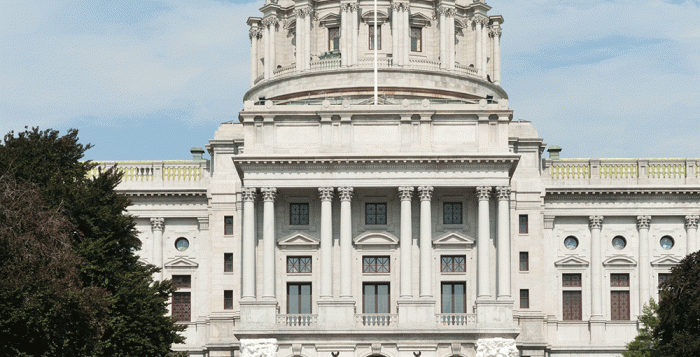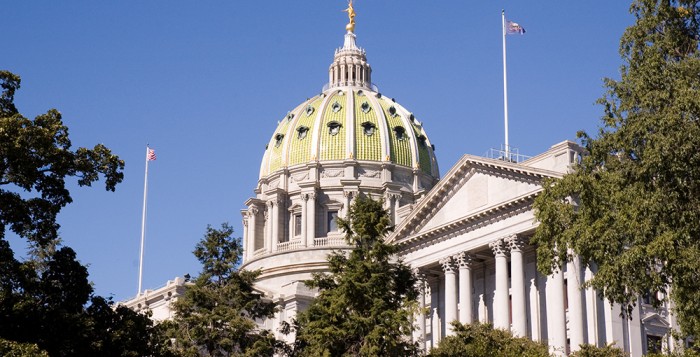By Chris Comisac
Bureau Chief
Capitolwire
HARRISBURG (Jan. 31) – The state Independent Regulatory Review Commission (IRRC) on Friday voted 3-2, with the commission’s three Democratic appointees supplying the “yes” votes, to approve regulations that seek to increase the earnings threshold below which certain individuals will be able to receive overtime payments from their employers.
“These regulations have been long overdue for updating,” said IRRC Commissioner Dennis Watson. “I don’t think any of us dispute that employers have the right to pay their employees what they believe to be an appropriate salary or hourly wage, but this state has also recognized under the Minimum Wage Act that there are positions that people work in in which there is an inequality of bargaining power.”
Watson said the state’s earning threshold for low-level, salaried employees hasn’t changed since 1977, and it was a long time coming. Both Commission Chairman George Bedwick and Commissioner Murray Ufberg – the other two “yes” votes – echoed Watson’s comments.
While Watson correctly noted the threshold in state law has not changed since 1977, federal law has superseded the state’s threshold, with, prior to the federal change implemented at the start of 2020, that threshold last being changed in 2004, when it was set at $23,600, or $455 per week.
Department of Labor and Industry Regulation #12-106 would increase the annual earnings threshold for executive, administrative, and professional (EAP) salaried workers to $40,560 in 2021 and then $45,500 in 2022, and then automatically adjust it every three years. The current threshold, which was just changed by the federal government on Jan. 1, is $35,568, meaning EAP workers who have annual earnings less than that amount – which state officials say total approximately 61,000 Pennsylvanians – would not be exempt from earning overtime pay if they work more than 40 hours in a workweek; once the 2022 changes are implemented, the Department estimates another 81,000 individuals would be eligible for overtime.
Watson added that the rulemaking’s changes to the state’s “duties test” are equally beneficial not just to employees, but also to employers, who Watson said will have better guidance and direction in determining how best to apply the “duties test.”
In addition to meeting the earnings threshold, the federal Fair Labor Standards Act (FLSA) provides that to be eligible for overtime, individuals must not have certain job responsibilities, i.e. duties, with regard to their employment, such as managing an enterprise (regularly directing the work of other employees, including being able to hire and fire employees), performing office or non-manual work directly related to the management or general business operations of the employer (where the employee can exercise their own discretion and independent judgment when performing those duties, or working in a job that requires advanced knowledge in a field of science or learning (with that knowledge “acquired by a prolonged course of specialized intellectual instruction”).
The Department’s regulation adopts the FLSA’s basic duties test, but does not incorporate all of the specific clarifications for the basic exemptions. The Department said it wasn’t able to adopt some of those clarifications due to differences between the federal FLSA and Pennsylvania’s Minimum Wage Act.
Despite the commission’s 3-2 decision that the rulemaking is in the public interest of Pennsylvania, several commenters, prior to the final vote, offered comments, many of them similar to concerns raised when the final regulations were unveiled in October. They suggested the Department’s rulemaking is inconsistent with federal law and regulation regarding overtime, creating uncertainty for the state’s employers. Critics claimed the regulation could simply have been written like other state overtime regulations.
“The statute allows the Department, and authorizes the Department, to define those duties that make an employee an exempt executive, administrative or professional [employee],” said Robert Pritchard, a shareholder of law firm Littler Mendelson P.C.’s Workplace Policy Institute, noting that neighboring states Ohio, New Jersey, New York and Maryland specifically adopt the federal regulatory provisions regarding duties by reference.
“It’s a simple, one-line regulation that says ‘For purposes of the EAP exemptions, we look to federal law. Period,’” Pritchard said. “The commission should disapprove the regulation and give the Department an opportunity to fix these regulations.”
Those same regulation opponents noted the IRRC, after review of the Department’s proposed overtime regulations, recommended the Department work with the regulated community to reach a consensus on how to draft the final overtime rules – something opponents of the rulemaking said clearly did not happen as the final rules were relatively unchanged, other than lowered earnings thresholds (the initial regulation sought to raise the threshold to $47,892 in 2022). Opponents also pointed to the automatic adjustments (every three years) of the earnings threshold included within the regulation as particularly onerous, arguing it removes the Legislature, IRRC and the public from the process of making future changes to the threshold, and because of an ever-escalating earnings threshold, ultimately makes the overtime duties test irrelevant, violating the federal FLSA.
Voting against the regulations, the commission’s two other members – Commissioners John Mizner and Russ Faber – while acknowledging the importance of the earning threshold update and more closely aligning Pennsylvania’s duties test with federal rules, said this is a situation of too much too quickly; that taking a more measured approach to identify possible impacts of the new rules might be more appropriate and avoid significant upheaval for employers, particularly small ones, that don’t have the capacity to absorb the fiscal impact of these changes. They also expressed concern the differing state and federal duties test provisions still present a problem for the state’s employers.
During the meeting, the Department responded to the criticism by indicating the rules approved by IRRC are only a first step, and there could be future regulations to more closely align Pennsylvania to federal rules and further eliminate uncertainty. State officials also argued that for too long, the earnings threshold has been so low as to eliminate the need for the duties test, creating the misconception within many areas of employment that simply because an employee is paid a salary, they aren’t eligible for overtime. The regulation will protect both employees – who should be paid overtime when they meet the requirements to receive it – and employers – who are provided with more clarity as to when they should be paying overtime – said the Department.
Focusing specifically on concerns raised about the automatic earnings threshold adjustment, the Department claimed the adjustment is rooted solely in what is occurring within the labor market, with it to be calculated based on what non-exempt employees are earning. State officials argued employers would not be unduly burdened by future changes as those changes would be a reflection of how the larger economy is performing.
Additionally, Commissioner Bedwick noted that a 2012 Pennsylvania Commonwealth Court decision – Naylor v. Commonwealth Department of Public Welfare – found that a change made by the then-Department of Public Welfare outside the regulatory review process was appropriate because it was initially provided for in a pre-existing regulation previously approved through the regulatory review process.
The Department argues the state Minimum Wage Act provides them with similar authority, as stated in Section 303.105(a)(5) of Pennsylvania Statutes Title 43 (Labor): “The secretary [of Labor and Industry] shall make and, from time to time, revise regulations, with the assistance of the board, when requested by the secretary, which shall be deemed appropriate to carry out the purposes of this act and to safeguard the minimum wage rates thereby established. Such regulations may include, but are not limited to, regulations defining and governing bona fide executive, administrative, or professional employees.”
Bedwick, while expressing the commission’s concern about going outside the regulatory review process, suggested the court case would, nevertheless, appear to allow the Department’s regulation. He said he’d like to see lawmakers do a better job in writing statute to prevent ways around the review process.
Reacting to the approval, Gov. Tom Wolf said in a statement: “This is an important victory for thousands of workers. People who work overtime should be paid for it. This is absolutely the right thing to do. Today’s approval of my plan will modernize our outdated overtime rules so more people are eligible for time-and-a-half pay. This will put more money in the pockets of workers and strengthen the middle class.”
The National Federation of Independent Business (NFIB), one of the vocal opponents of the overtime regulations, reacted with disappointment to the IRRC vote.
“Many small business owners submitted comments explaining this excessive expansion of overtime will cause them financial turmoil, leading to fewer hours for employees, and a limit on future promotions for those who have just moved from hourly to salaried positions,” said NFIB’s legislative director in Pennsylvania, Rebecca Oyler, who also spoke against the rules during the meeting offering similar comments.
“The costs of this rule are significant, and unfortunately, money doesn’t appear out of thin air when the government places such a mandate on small businesses. It will impact business growth, hiring and job creation – and it certainly won’t help employees as the Governor claims,” argued Oyler, noting that younger employees will likely be limited in the ability to move higher on the workplace ladder with many employers. “A decision with such significant financial ramifications should be decided by the Legislature not the Governor alone.”
The decision is also notable as it appears to close the door on an agreement that had been reached between Wolf and the Republican-controlled state Senate regarding an increase of the state’s minimum wage.
Late last year, the Senate approved a phased-in hike of the minimum wage (Senate Bill 79) that would ultimately get the hourly wage rate to $9.50 by 2022. That approval came with a condition that should the wage hike become law, the Wolf administration would not seek to implement its overtime regulations (the Wolf administration briefly withdrew its overtime regulations, on Nov. 21, following Senate approval of SB79, but resubmitted the rulemaking to IRRC on Dec. 9 with IRRC scheduling consideration of the rule on Jan. 31).
Republicans in the GOP-controlled House of Representatives noted they weren’t part of the deal made by Wolf and the Senate GOP, and there appeared to be a limited amount of communication and negotiation by both the Governor and the House GOP. With no House voting session days scheduled between Nov. 21 and Dec. 9, and only three voting session days scheduled in December after IRRC received the resubmitted regulations, many within the House GOP Caucus argued the Wolf administration wasn’t serious about giving the House time to consider the legislation, and was instead dictating policy to them. The Governor’s Office responded to House GOP Caucus complaints by saying the caucus had several years to work out a deal with Wolf, but they chose not to do so.
Ultimately, no wage hike bill was passed before the overtime regulation was approved by the IRRC, but Wolf said he intends to keep pressing for a much bigger minimum wage hike – to $15 an hour by 2026, with an automatic escalator to adjust the wage rate thereafter – as part of his 2020-21 state budget.
While the overtime regulation vote would appear to close the door on things, there still could be more time for a deal to be worked out, since the Legislature has a few options – time-consuming ones – left to it.
Pennsylvania Chamber of Business and Industry president and CEO Gene Barr voiced his support for the GOP-controlled Legislature to exercise those options in a statement following the IRRC vote: “Unfortunately, the proposal approved today is only minimally different from the Department’s initial proposal and largely disregards the concerns raised by stakeholders. We urge the General Assembly to consider the true impact of this proposal and for each legislative chamber to issue disapproval resolutions rejecting the change.”
As per the regulatory review process, since both standing committees (the House and Senate Labor and Industry committees) did vote to disapprove the overtime regulation, the regulation cannot move forward in the process (normally a review by the Office of Attorney General before going into effect, if approved by the OAG) for 14 days.
During those two weeks, either chamber of the General Assembly could introduce a concurrent resolution to disapprove the regulation; if no such resolution is introduced, the regulation heads to OAG.
If a resolution is introduced, then the General Assembly has 30 calendar days or 10 legislative days – whichever is a longer period of time – to approve the resolution. If not approved in that time frame, the regulation goes to the OAG; if approved the resolution is sent to the Governor for consideration.
Should the Governor veto it (as would likely be the case for this regulation), the General Assembly is given another 30 calendar days or 10 legislative days – whichever is longer – to vote to override the veto.
There do not appear to be enough votes in either chamber to override, so the regulation would ultimately end up at the OAG. However, given the time of year, the General Assembly’s legislative calendar is light on legislative days.
Both chambers are readying to begin their state budget hearings on Feb. 18, following Wolf’s Feb. 4 budget address. After both chambers are in session on Feb. 5, neither chamber is scheduled to be back in session until March 16, meaning there’s a possibility this could play out until, maybe, mid-to-late May if House Republicans want to buy themselves more time.


















